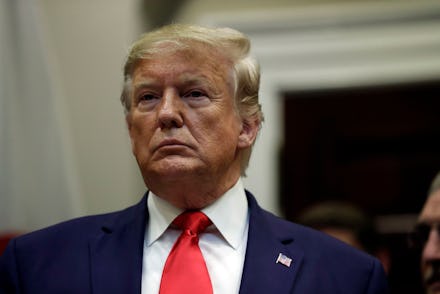Trump blocked an ambassador's Ukraine testimony, continuing his pattern of obstruction

On Tuesday morning, as President Trump's Ukraine scandal grows, U.S. Ambassador Gordon Sondland was set to testify to the House of Representatives about his role in the whole thing — until he suddenly announced that the State Department had blocked him from doing so. Sondland, the U.S. envoy to the European Union, is a hotel mogul and Trump campaign contributor who had no prior experience with Ukraine before Trump directed him to lead the administration’s policy in the country. He’s become enmeshed in the Ukraine affair thanks to explosive text messages that were released last week in which Sondland appeared to be coordinating an effort to lock down a commitment from Ukraine to investigate Vice President Joe Biden and his son Hunter.
Sondland had previously expressed interest in testifying to Congress, but his lawyer Robert Luskin said Tuesday that “as the sitting U.S. Ambassador to the [European Union] and an employee of the State Department, Ambassador Sondland is required to follow the Department’s direction.” Luskin added that Sondland was “profoundly disappointed that he will not be able to testify.”
The text messages were provided to House Democratic leaders by Kurt Volker, the Trump administration’s former top diplomat in Ukraine who resigned last month. In them, Sondland appears to be orchestrating a plan to use $400 million in aid and the prospect of a White House meeting between Ukrainian President Volodymyr Zelensky and Trump as leverage to request an investigation into the Bidens. In one text, Sondland emphasized that Trump “really wants the deliverable.”
Democrats leading the impeachment inquiry were eager to question Sondland about his role in the administration’s scheme. Rep. Adam Schiff (D-Calif.), the chairman of the House Intelligence Committee, told reporters that Sondland sent more relevant texts that the State Department is withholding. In an interview with The Washington Post, Schiff did not rule out going to court to enforce House subpoenas requesting information related to the Ukraine matter, and he additionally made clear that his committee would view further efforts by the White House to stymie his investigation as obstruction of justice — an impeachable offense separate from the one the House is already investigating, which hinges upon inviting a foreign power to meddle in the U.S. election process.
“We need to protect the country," Schiff said. "We need to expose whatever wrongdoing has gone on. That work is going to have to proceed.” He also let slip to reporters that the additional texts being held by the State Department are on Sondland’s personal device.
For his part, Trump has taken ownership of the decision to block Sondland’s testimony. “I would love to send Ambassador Sondland, a really good man and great American, to testify, but unfortunately he would be testifying before a totally compromised kangaroo court, where [Republicans’] rights have been taken away, and true facts are not allowed out for the public to see,” he tweeted. He also pointed to a specific text message Sondland sent while discussing the administration’s dealings with Zelensky in which he wrote to another White House diplomat: “I believe you are incorrect about President Trump’s intentions. The president has been crystal clear: no quid pro quo’s of any kind.”
Of that message, Trump declared: “That says it ALL!”
Of course, that doesn’t say it all, considering that Sondland’s text came in response to career diplomat Bill Taylor writing, “I think it’s crazy to withhold security assistance for help with a political campaign.” Sondland’s response also came only after a five-hour pause — during which Sondland called Trump, per The New York Times. Sondland then asked Taylor to stop texting and instead discuss the matter over the phone, possibly to eliminate any further paper trail. Schiff has made clear that hearing testimony from Taylor is a high priority for the House.
Even beyond the sketchy details and obfuscations, Trump’s tweet makes clear that he is moving his battle with impeachment investigators into a new phase. By taking ownership over blocking Sondland, he is trying to discredit the impeachment investigation on a fundamental level, arguing that the House has no right to impeach him at all because it is currently led by Democrats. He’s going to be backed up on this front by conservative stalwarts like Ohio Rep. Jim Jordan (R), who told reporters Tuesday morning that “Schiff and Speaker [Nancy] Pelosi are biased, and we understand why the administration is blocking Sondland.”
Trump’s stonewalling tactics will likely only provide Schiff and company with further ammunition to claim that Trump is obstructing their investigation; Schiff and his fellow House committee chairmen have already announced that they will be issuing a subpoena to Sondland for his testimony as well as his records. But Trump has already shown a willingness to direct witness cooperation, and he will likely continue to publicly defy any attempt to hold him accountable. What remains to be seen is whether his hardball tactics can forestall the growing storm of voices in the House and Senate demanding answers.